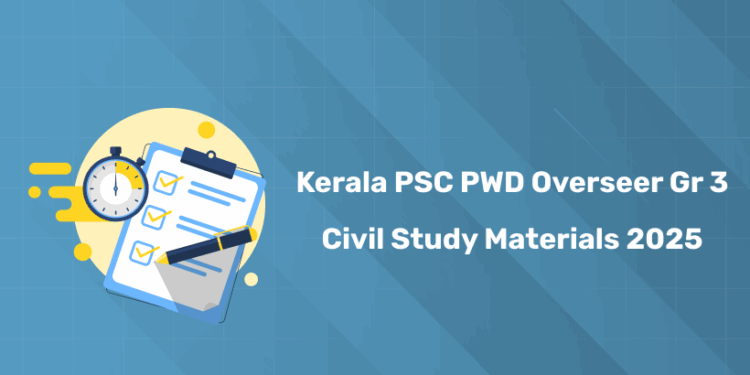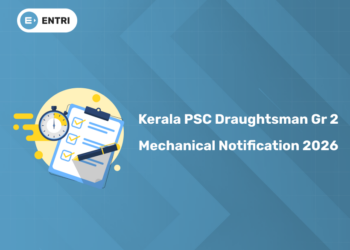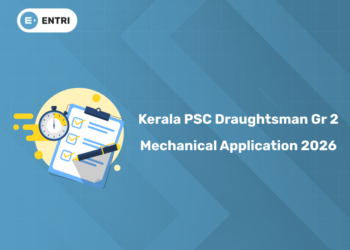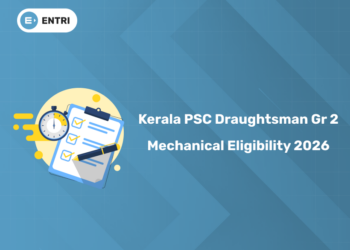Table of Contents
The Kerala PSC Overseer/Draftsman Grade 3 Civil exam 2025 is expected soon as the latest notification has been announced. Effective preparation requires the right study materials and tools. In this blog, we have curated a comprehensive list of books, reference guides, online resources, and study aids to help candidates prepare efficiently and maximize their chances of success. Explore now!
Kerala PSC PWD Overseer Grade 3 Civil Recruitment 2025 Highlights
| Event | Details |
|---|---|
| Recruiting Organization | Kerala Public Service Commission (KPSC) |
| Department | Public Works Department (PWD) |
| Post Name | Overseer Grade 3 (Civil) |
| Category Number | 222/2025 |
| Pay Scale | ₹ 26,500-60,700/ |
| Vacancies | 02 |
| Notification Release Date | 31 July 2025 |
| Application Start Date | 31 July 2025 |
| Last Date to Apply | 03 September 2025 (up to 12:00 midnight) |
| Mode of Application | Online only (via Kerala PSC Thulasi Profile) |
| Official Webiste | www.keralapsc.gov.in |
Kerala PSC PWD Draftsman/Overseer Grade 3 Civil Study Materials 2025
1: Between the period of 1858-1947, how many Viceroys ruled over India?
The Kerala PSC PWD Draftsman/Overseer Grade 3 Civil exam 2025 is expected soon. To prepare effectively, candidates need the right study materials and tools. Here is a list of essential reference guides and study aids to help plan focused and efficient preparation.
Kerala PSC Official Website
The official website provides notifications, syllabus updates, exam dates, and other important announcements. Regularly checking ensures you are aware of deadlines, eligibility changes, and any new instructions directly from the commission, preventing last-minute surprises.
Online app
Platform like Entri offering mock tests, video lectures, practice questions, and performance tracking. It helps replicate real exam pattern, identify weak areas, and gradually improve speed and accuracy while preparing for the Kerala PSC Overseer Grade 3 civil exam.
Previous Year Question Papers
Analyzing old question papers helps you understand recurring question patterns, difficulty levels, and high-weightage topics. Practicing them improves time management, highlights important areas, and familiarizes you with the actual exam structure for focused preparation.
| Question Paper Category | |
| 165/2016 | |
| 038/2016 | |
| 011/2016 | |
| 018/2014 | |
| 067/2014 | |
| 030/2014 |
Standard Reference Books
Core Civil Engineering books cover topics like RCC, Surveying, Estimating, and Public Health. These provide in-depth knowledge, theoretical understanding, and examples to solve practical problems efficiently, forming the backbone of strong preparation.
Overseer Gr 3 Exam Pattern
Know the exam pattern, duration, marking scheme, and question types. Being aware of time allocation, negative marking, and total marks helps improve preparation focus, strategy, and performance in the exam.
- Duration of Exam: 1 hour 30 minutes
- Medium of Question Paper: English
- Total Marks: 100
- Marking Scheme:
- Each correct answer: +1 mark
-
Each wrong answer: -1/3 mark (penalty)
-
| Module No. | Subject | Marks |
|---|---|---|
| 1 | Building Materials | 15 |
| 2 | Construction Technology | 15 |
| 3 | Building Drawing and Planning | 10 |
| 4 | RCC and Steel Structures | 10 |
| 5 | Public Health and Sanitary Engineering | 5 |
| 6 | Roads, Railways, Bridges and Tunnels | 10 |
| 7 | Irrigation Engineering | 10 |
| 8 | Estimating and Costing | 5 |
| 9 | Surveying and Levelling | 10 |
| 10 | Engineering Mechanics | 10 |
Overseer Grade 2 Syllabus PDF
Downloading the official syllabus PDF allows structured planning. Understanding topic weightage and modules ensures candidates prioritize high-mark sections and avoid spending time on irrelevant areas.
Time Table
A structured timetable organizes study hours, allocates time for each subject, and ensures full syllabus coverage. Planning sessions systematically reduces stress, keeps preparation on track, and balances revision and practice effectively.
Online Video Lectures
Platforms like YouTube and Entri provide visual explanations of complex topics. Watching lectures helps in understanding difficult concepts, improving retention, and clarifying doubts that may not be easily grasped through books alone.
Notes from Coaching Classes
Coaching notes provide concise, organized summaries of topics. These are useful for quick revisions and focusing on important points without repeatedly going through entire textbooks, saving time and improving efficiency.
Flashcards
Flashcards are ideal for memorizing formulas, key definitions, abbreviations, and important concepts. They allow quick daily revisions and improve retention, especially for technical subjects that require constant recall.
Mind Maps
Mind maps visually connect topics, showing relationships between concepts. They make complex subjects easier to understand, aid memory retention, and are particularly helpful for revision before exams to recall key points quickly.
Mock Tests
Practicing mock tests improves exam preparation level. They help enhance speed, accuracy, time management, and confidence while allowing identification of weak areas for focused improvement.
Study Groups
Group discussions provide different perspectives, help clarify doubts, and share preparation strategies. Peer learning motivates candidates, exposes them to new methods, and reinforces learning through teaching others.
Engineering Magazines/Journals
Keeping up with magazines and journals introduces modern construction methods, materials, and techniques relevant to the syllabus. It strengthens practical understanding and broadens knowledge beyond textbooks.
Daily Quiz Practice
Apps like Entri enable on-the-go practice, daily quizzes, and instant feedback. They make learning flexible, ensure continuous engagement, and allow performance tracking anytime, anywhere.
Engineering Formula Sheets
Precompiled sheets of important formulas for Mechanics, Surveying, and Estimating save time during revision. Quick access to formulas ensures accuracy and efficiency while solving numerical questions.
Previous Year Cut-off Analysis
Analyzing past cut-offs helps set realistic score targets, understand competition trends, and focus on scoring topics, allowing a more strategic and goal-oriented preparation approach.
Time-bound MCQs series
Timed MCQs enhance speed and precision. They help manage time efficiently during the actual exam, and allow candidates to practice completing questions within the allocated time period.
Revision Notes
Condensed notes aid last-minute revision, saving time while reinforcing important concepts, formulas, and definitions. They provide a quick reference without going through entire textbooks repeatedly.
Self-Assessment Checklists – Checklists help track completed topics, assess strengths and weaknesses, and ensure systematic coverage of the syllabus. Regular self-assessment ensures consistent progress and identifies areas needing extra focus.
Technical Dictionaries
Civil engineering dictionaries clarify terms, definitions, and abbreviations. Using them ensures precise understanding and avoids errors in technical questions during exams or practical applications.
Question Banks
Compiled question banks focus on frequently asked topics. Practicing these targeted questions improves speed, accuracy, and familiarity with the types of questions likely to appear in the exam.
Model Papers
Extra practice through sample or model papers helps reinforce learning, identify weak areas, and gain confidence.











